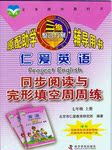题目内容
Some chapters of the book ________ by those scientists.
- A.have been widely read
- B.have been read wide
- C.have been researched
- D.have looked through

 百年学典课时学练测系列答案
百年学典课时学练测系列答案 仁爱英语同步练习册系列答案
仁爱英语同步练习册系列答案If you’re like most students, you may find it challenging to learn a foreign language. However, there are a few tips you can use in order to earn a top grade —— as well as actually use the skills you’ve learned.
One of the most important and basic lessons in dealing with a foreign language is to learn and understand each concept and lesson before moving on to the next one. If you don’t understand one concept but move on to the next chapter anyway, you’re less likely to understand the new material.
Learning a new language is not only an academic tool, but can help you in your everyday life as well. Being good at another language can help you communicate with other people, and help you when traveling to foreign countries, and even make your resume look better.
And it is important to learn correct pronunciation as soon as possible for poor pronunciation can be hard to break. Native speakers of the language as well as others fluent in the language you are learning will appreciate your efforts to learn correct pronunciation.
Gather outside materials such as books, study guides, books on tape, and travel books to aid you in learning the language. Your textbooks can’t possibly teach you everything you need to know, so seeking outside sources is generally a good rule of thumb to keep in mind.
A significant motivator in learning a foreign language is traveling to the country where the language is spoken. That way, you can see firsthand how the language is used, learn the culture, and meet native speakers of the language. Native speakers appreciate sincere attempts of others who take the time to learn their language.
Seek out native speakers of your new language in your school or neighborhood. They can help you with many skills, including pronunciation, and they can provide immediate feedback on your progress.
【小题1】This passage is written to .
| A.explain why learning a foreign language is challenging |
| B.tell us the importance of learning foreign languages |
| C.tell us some ways of earning a top grade |
| D.give us some tips on learning foreign languages |
| A.Think beyond academics. |
| B.Learn each concept. |
| C.Plan a trip to use your skills. |
| D.Consider a language as a tool. |
| A.textbooks are not good for us when learning a foreign language |
| B.learning pronunciation well from the very beginning is very important |
| C.poor pronunciation can be easy to break with the help of native speakers |
| D.seeking too many outside sources will be more harmful than beneficial |
| A.Going on a trip abroad. |
| B.Practicing with native speakers. |
| C.Asking for feedback from our teachers. |
| D.Finding a motivator in learning language. |
| A.Entertainment. | B.History. | C.Education. | D.Nature. |
根据短文内容,从下框的A—F选项中选出能概括每一段主题的最佳选项。选项中有一项为多余项.
|
A.Pay Attention to the Organization of an Article. |
|
B.Check Your Understanding. |
|
C.Lightning Speed Exercise |
|
D.Set Aside Time Each Day. |
E.Check Your Progress through Pacing
F.Speed up When Necessary.
61.______
Most of us can find 15 minutes or half an hour each day for some specific regular activity. For example, one famous surgeon always made it a rule to spend at least 15 minutes on general reading before he went to sleep each day. Whether he went to bed at 10 p.m. or 2:30 a.m. made no difference.
62.______
Nearly all ‘speed reading’ courses have a ‘pacing’ element---some timing device which lets the students know how many words a minutes he is reading. You can do this simply by looking at your watch every 5 or 10 minutes and noting down the page number you have reached.
63.______
Obviously there is little point in increasing your reading speed if you do not understand what you are reading. If you find you have lost the thread of the story, or you can’t remember clearly the details of what was said, re-read the section or chapter.
64.______
Take four or five pages of an interesting book you happen to be reading at the time. Read them as fast as you possibly can. Do not bother about whether you understand or not. After a ‘lightning speed’ of reading, you will usually find that your ‘normal’ speed has increased.
65.______
Most paragraphs in an article have a ‘topic sentence’ which expresses the central ideas. The opening paragraph often suggests the general direction and content of the piece, while paragraphs that follow expand or support the first. The closing paragraph often summarizes the very essence(实质) of what has been said.